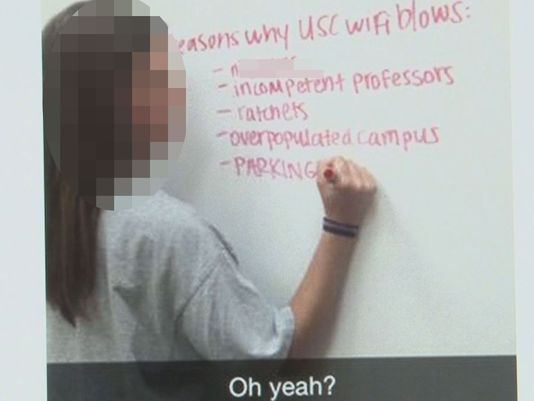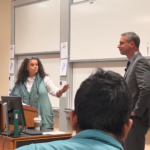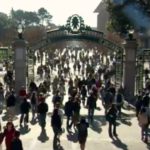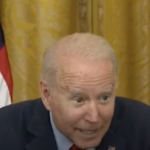University of South Carolina Wrongly Suspends Student for Racism
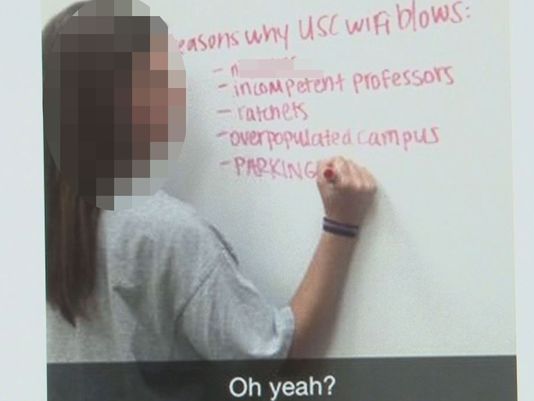
The University of South Carolina has suspended a student, apparently for writing the N-word on a white board in a study room on campus, revealed in a photo that was posted online:
This controversy has attracted attention not merely on campus and in the community, but also nationwide and even on the NBC Nightly News.
President Harris Pastides issued a statement declaring, “Respect for all is at the heart of the Carolinian Creed, the code by which we agree to abide. Racist and uncivil rhetoric have no place at the University of South Carolina. We have taken appropriate actions to suspend a student and begin code of conduct investigations. The Board of Trustees has endorsed this prompt course of action.”
The Carolinian Creed does indeed require “respect” and “discourage bigotry.” But as the university explains about the Creed, “Instead of limiting student’s rights through the creation of more rules, it set an example for all to follow.” The Creed, created in 1990, was a misguided attempt to explain campus ideals. It was not “a code by which we agree to abide,” as President Pastides thinks. If it were, it would be one of the worst speech codes in the country, since any code that required everyone to “demonstrate concern for others” and “their feelings” is extraordinarily repressive and plainly unconstitutional.
If you look at the actual conduct code of the University of South Carolina, nothing this student did violates it. The code of conduct is very badly written, and broadly restricts constitutionally protected speech with regulations against “Conduct that disturbs the peace or disrupts the rights or privileges of others.” It also bans “Interfering with or disrupting the normal activity and operations of the university or its educational mission, programs, or events.” In fact, South Carolina’s speech code is so broad it actually allows for expelling a student who makes an “unusual noise” if that’s deemed disruptive.
But even by these vague standards, what happened does not qualify as a violation of the code of conduct. A photo on social media doesn’t “disrupt” anything. It cannot disturb the peace because the only thing it does is exist in cyberspace. Nor does a heckler’s veto legally exist: if a controversial idea causes a disruptive response, you can only punish the person who disrupts, not the person with provocative ideas.
These repressive speech codes like the University of South Carolina’s utilize words that were designed long ago, with the aim of suppressing peaceful protests on campuses by calling them “disruptive.” But social media doesn’t fit into these outmoded approaches.
The University of South Carolina’s action go even further, because they have suspended the student without a hearing, presumably under the “emergency action” part of the Code of Conduct. Here’s what that says: “The University may impose emergency action upon a student or student organization when there is reason to believe, based upon available evidence, that the student/student organization poses an immediate threat to the safety, health or welfare of persons, property or to the orderly operation of the University.”
Even according to this extremely vague code, there is no “immediate threat” posed to anyone by this photo of offensive words. No one seriously believes that the student who is pictured poses an “immediate threat” to anyone. Indeed, the only immediate threat involved in this case is to the student in the picture, who has reportedly been identified and received death threats.
Of course, the fact that the University of South Carolina is violating its own rules in this case does not answer the deeper philosophical question: should students who use bigoted language be punished by universities?
I say no. First of all, sometimes people use racist language for non-racist or even anti-racist reasons. In this case, the student is writing a list of “reasons why USC WiFi blows” but the answers have nothing to do with WiFi. Is this person just a racist idiot? Or are they mocking racist idiots on campus by providing a list of dumb things they’ve heard ignorant people say?
But even if we proved without a doubt that this student is racist (as in the University of Oklahoma case), I would oppose formal punishment by the university. There is no principled way to toss out a few openly racist people without endangering many more non-racists. For example, if universities ban the use of the N-word, a whole lot of African-Americans will end up being punished, not white people. And if a university declares that only non-black people who use the word will be punished, a racial discrimination lawsuit is inevitable. And a large number of rap songs by black artists will be effectively banned on campus.
Then there’s the slippery slope: you can’t just ban one racist word. You have to ban the expression of any bigoted ideas. You have to ban hateful expressions against blacks, whites, Latinos, Asians, gays, straights, men, women, Jews, Christians, Muslims, atheists, and everyone else. Everyone has had the experience of being falsely accused of some kind of bigotry (or agreeing with someone else who has). Should you be prosecuted under a campus code of conduct for it?
And then there’s the problem of effectiveness. Banning racist language doesn’t end racism. It simply spurs the development of coded language. The way we fight against racism is by denouncing it, not by punishing it. The University of South Carolina had the opportunity to show its values by condemning racism. Instead, the president and the Board of Trustees decided to violate the First Amendment and their campus codes in a misguided attempt at spin control. Instead of working to defeat racism by educating students, they chose the phony symbolism of illegally punishing a student for her unpopular speech, and hoping that the media attention will disappear quickly
The University of South Carolina’s slogan is, “No Limits.” That obviously doesn’t apply to free speech at the University of South Carolina, but it should.

